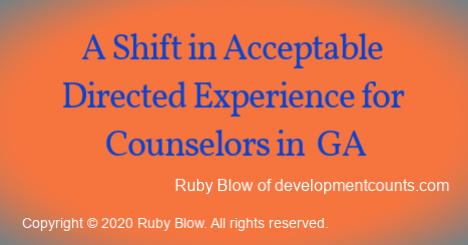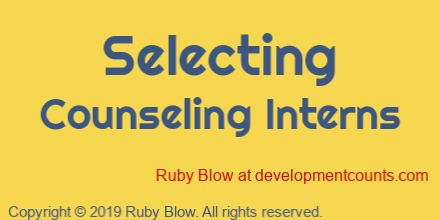The Great Divide
It seems to me that there is a difference of understanding and expectations between those pursuing licensure and those issuing licenses in Georgia; specifically related to issuing licenses to associate professional counselors and licensed professional counselors.
It is clear that the licensing board’s role is to protect the public. Their actual function is to determine who has successfully met the licensing criteria and who has not. After which a license is either issued or denied. Applicants are, of course, given the reason for the denial and thus an opportunity in most cases to correct errors or meet criteria (if at all possible).
Counseling Redefined
The counseling profession (via regulations) continues to redefine itself both here in Georgia and across the country as a result of the efforts to do the following:
- define the field of practice;
- create more parity for counselors moving to other parts of the country;
- and improve the quality of counseling while the profession continues to take shape.
We are experiencing a narrowing of the counseling identity into clinical mental health counseling, despite that fact that in Georgia both school settings and industrial organizational settings (among others) are listed in the definition for counseling work settings.
In its inception, counseling was a big tent profession with sub-types. Like social work, not all social workers completed the clinical track in their training programs. Yet in Georgia, all social workers have had the opportunity to pursue clinical licensure. Generally speaking, all types of counselors did as well, but that time is quickly coming to a close. This may or should be changing now as all licensees under the diagnosis law SB 319 are required to have a psychopathology/diagnosis course.
Licensure is Serious Business….As it Should Be!
Licensure as a counselor in Georgia is a serious endeavor, not just because of the requirements…but because of what having a license permits one to do. Licensure permits one to treat people with mental illness. The consequences of malpractice or incompetent practice can mean life and death. That is true for all clinicians, even those who are deemed to be highly capable and competent.
Supervisor Standards
In Georgia, our efforts to improve the quality of practice by those obtaining licensure has focused in part on setting certification standards for supervisors who are counselors.
The mere creation of those standards for supervisors has led to a large influx of either new supervisors or supervisors who are in process of changing the way they provide clinical supervision.
Becoming an intentional supervisor has many complexities. Just like becoming a counselor, it involves going from theory to practice effectively. In counselor development, a supervisor is utilized to facilitate the process of professional learning and oversight as clinicians develop. Supervision is a critical part of pre-graduate school internship as well as post graduate practice.
The Public is Trusting Us
Many employers and counselors themselves presume a certain level of proficiency post graduation. The truth is that counseling professionals finish graduate school at various levels of competence and expertise. Because of the serious nature of what counseling licensure allows one to do, it is vital that the public be adequately protected. In other words, the public should be able to do the following:
- Trust that they are emotionally and physically safe with a licensed professional.
- Beyond safety, they should presume a basic level of competence for practicing counseling or psychotherapy.
- They should be able to trust that they will receive sound treatment.
- They should be able to trust that their counselor will be honest about what they know and don’t know; about what they have the ability to treat or not treat.
For mental health professionals, the ability to be honest about one’s limits requires putting one’s client/patient ahead of one’s self.
Supervision Competencies and Licensing Board Regulations…There is a Relationship Somewhere
Our codes of ethics guide us to not practice beyond our scope of competence. Competence is gained by learning and monitored doing. That monitoring of practice might come via
- clinical supervision (toward licensure or certifications),
- or consultation (post licensure).
So when we as a profession begin to implement more stringent standards for both counselors and their supervisors there are bound to be some necessary course corrections.
For example, the field of study for supervision encourages supervisors to take very seriously their role as supervisor by doing all of -but not limited to- the following:
- Work within your own scope of competency as a supervisor and support practicing within competency for supervisees.
- Get supervision training and also consultation with an experienced supervisor, alongside practice as a supervisor.
- Uphold supervisory ethics (reduce the power differential and reduce the risk of harm to supervisees). Don’t engage in boundary violations and be cautious about boundary crossings, as the supervisee is vulnerable to the supervisor.
- Monitor your supervisee’s clinical practice by meeting with them regularly to provide supervision. Including discussions about their cases, ethics, professional & personal development.
- Give verbal and written evaluative feedback on both their strengths and challenges.
- Be multi-culturally competent in practice as it relates to race, age, gender, ethnicity, national origin, religion, sexuality etc….and support multicultural competencies in your supervisees.
- Safeguard the profession by not promoting someone toward licensure who you have determined does not meet the standards of the profession. This should only be done with adequate monitoring, feedback, consultation, written evaluation, remediation planning and support toward improvement etc…
All of the above standards, and many more, are a part of the best practices of supervision. And we are promoting effective supervision, which takes time. Then what happens after a short period of time in supervision…say 3 months, 6 months, 9 months or even a year…if the supervisee is given a chance for improvement? Why is it that, regardless of the applicants deemed competence by a supervisor, a license can and many cases will be issued to the applicant…even when the supervisor checks “I do not recommend”?
How We Can All Fulfill Our Roles (Applicants, Supervisors, Professional Associations, etc…)
I am not suggesting that supervisors are infallible, because we are not. What I am suggesting is that a further examination is in order if the true goal of both licensure and supervision itself is to protect the public via the issuance of licenses and the adherence to licensing standards (which requires supervision and presumably supports the duty and role of supervisors).
As a profession, we need to fortify the standards for supervisors beyond education and enhance it by way of supervised practice (as in “supervision of supervision” or “supervision consultation”). Without these improvements we leave supervisees vulnerable to supervisory malpractice.
In part, I believe that licenses are being issued strictly on the basis of meeting requirements that can be measured…because of a few reasons:
- An applicant meets the education requirements, the hours requirements (within the time frames) and passes the exam
- Tension or complaints between supervisors and supervisees in large part involve either personal differences, supervision process issues and/or competence/ethical concerns from either party. All of which is difficult to parse through.
Food for Thought
Technically, there is nothing in the licensure requirements that says the applicant has to meet the competency standards of the supervisor. Therefore selecting “Do not recommend,” is an option that holds little value.
Furthermore, a critical statement by the supervisor on an application could incite an applicant to rightly or wrongly build an ethical or legal complaint against a supervisor. Also, a competent applicant can easily be mislabeled by a supervisor who is struggling to put into practice all that they have been taught about supervision.
Supervision Certification and the Role of Professional Associations
Certification of supervisors has been farmed out to professional associations. In Georgia, that includes LPCA-GA’s, CPCS, or the NBCC’s ACS. We have a high volume of counseling licensure applicants, as compared to Social Work and Marriage and Family Therapy. The licensing board relies on professional associations to manage and monitor supervision credentialing. It would be very difficult for the licensing to board to take over the supervisor credentialing. Therefore it is up to the professional associations (made of counseling professionals and in varying degrees by administrators for the day to day functions on a national level and to some extent a local (state) level) to determine how we can clean up our own house and reduce the heavy lifting on the part of the licensing board.
Questions for Discussion and Consideration
How do we as members of the profession provide and support better quality supervision and sensible recourse between supervisors and supervisees?
How can we adopt practices for the continued development of our profession that involve “doing no harm” and also “doing good?”
In what ways do our professional organizations adequately seek and implement the sound advice of its own professional membership?
How can professional association board members (who are also members of our profession) best serve their function and ensure ethical practices and quality standards that are in alignment within the association, as opposed to business standards of practice?
Remember — it is not up to someone else. The direction of our profession is in large part determined by the members of the profession itself. It is up to us. We are responsible for where we go from here.
Copyright © 2018 Ruby Blow. All rights reserved.
Share your thoughts on Linkedin, Facebook, Twitter or log in to one of your accounts below to comment. Subscribe to my YouTube channel.





